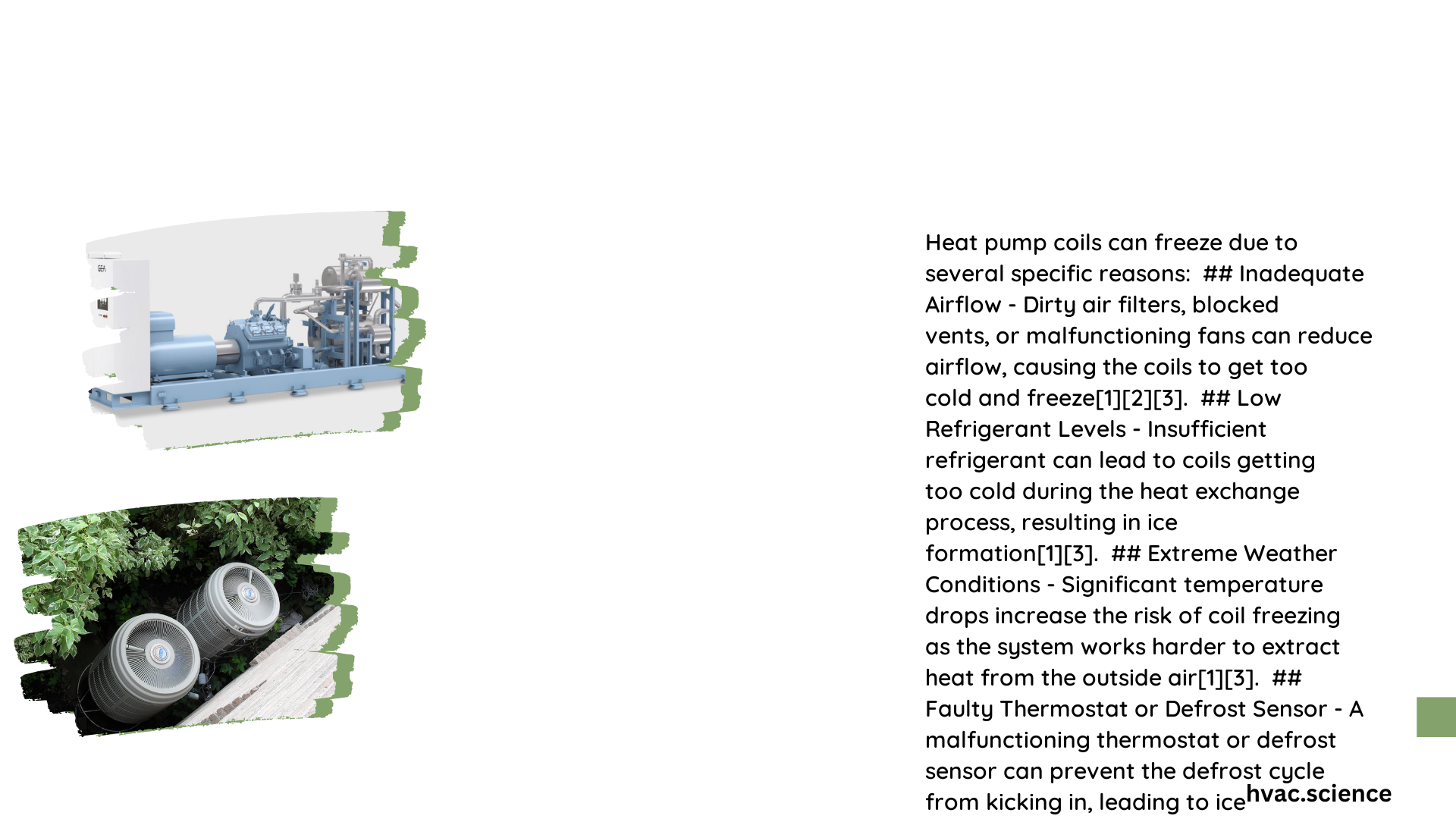Heat pump coil freezing is a common issue that can significantly impact system efficiency and performance. This problem occurs when ice forms on the evaporator or condenser coils, hindering heat transfer and potentially damaging the unit. Understanding the causes, recognizing symptoms, and knowing how to prevent and address frozen coils is crucial for maintaining a well-functioning heat pump system.
What Causes Coils to Freeze Up on a Heat Pump?
Several factors can contribute to coils freezing up on a heat pump:
- Low outdoor temperatures: When temperatures drop below freezing, the risk of ice formation increases.
- Insufficient airflow: Restricted airflow prevents proper heat exchange, leading to freezing.
- Low refrigerant levels: Inadequate refrigerant can cause the coils to become too cold.
- Malfunctioning defrost cycle: A faulty defrost mechanism fails to remove ice buildup.
- Dirty air filters: Clogged filters restrict airflow, increasing the likelihood of freezing.
- Blocked outdoor unit: Debris or snow can obstruct the outdoor coil, impeding heat transfer.
How Can You Identify Frozen Heat Pump Coils?

Recognizing the signs of frozen coils is crucial for timely intervention:
- Visible ice or frost on the outdoor unit
- Reduced heating performance
- Unusual noises from the system
- Increased energy bills
- Indoor coil freezing (in severe cases)
What Steps Should You Take When Coils Freeze Up?
If you suspect your heat pump coils are freezing, follow these steps:
- Turn off the heat pump to prevent further damage.
- Check and clean or replace air filters.
- Clear any debris from around the outdoor unit.
- Allow the ice to melt naturally (do not use sharp objects to remove it).
- Once thawed, restart the system and monitor its performance.
- If the problem persists, contact a professional HVAC technician.
How Does the Defrost Cycle Prevent Coil Freezing?
The defrost cycle is a crucial feature in heat pumps that helps prevent coil freezing:
- It typically activates every 30-90 minutes when outdoor temperatures are below 40°F (4°C).
- The cycle reverses the refrigerant flow, sending warm refrigerant to the outdoor coil to melt ice.
- A properly functioning defrost cycle should last 3-15 minutes.
- Malfunctions in the defrost control board or sensors can lead to inadequate defrosting and ice buildup.
What Maintenance Practices Can Prevent Coil Freezing?
Regular maintenance is key to preventing coils from freezing up on your heat pump:
- Clean or replace air filters monthly: This ensures proper airflow through the system.
- Keep the outdoor unit clear: Remove debris, snow, and vegetation from around the unit.
- Schedule annual professional maintenance: A technician can check refrigerant levels and system components.
- Ensure proper insulation: Insulate refrigerant lines to prevent heat loss.
- Monitor system performance: Pay attention to any changes in heating efficiency or unusual noises.
How Do Environmental Factors Affect Coil Freezing?
Environmental conditions play a significant role in coil freezing:
| Factor | Impact on Coil Freezing |
|---|---|
| Temperature | Freezing more likely below 32°F (0°C) |
| Humidity | High humidity increases condensation and freezing risk |
| Precipitation | Rain or snow can accumulate on coils and freeze |
| Wind | Strong winds can affect defrost cycle efficiency |
What Are the Long-Term Effects of Frequent Coil Freezing?
Repeated instances of coils freezing up on a heat pump can lead to:
- Reduced system efficiency and higher energy bills
- Increased wear on compressor and other components
- Potential refrigerant leaks due to stress on coils
- Shortened lifespan of the heat pump system
- Costly repairs or premature system replacement
When Should You Call a Professional for Frozen Coils?
While some causes of coil freezing can be addressed by homeowners, certain situations require professional intervention:
- Persistent freezing despite DIY efforts
- Suspected refrigerant leaks
- Malfunctioning defrost cycle
- Unusual noises or vibrations from the system
- Significant decrease in heating performance
A qualified HVAC technician can diagnose complex issues and perform necessary repairs to prevent future freezing incidents.
How Can You Optimize Heat Pump Performance in Cold Climates?
To minimize the risk of coils freezing up on your heat pump in colder regions:
- Consider installing a cold climate heat pump designed for low temperatures.
- Use supplemental heating sources during extreme cold spells.
- Ensure proper sizing and installation of the heat pump system.
- Implement a regular maintenance schedule, especially before the heating season.
- Monitor outdoor unit placement to protect it from harsh weather conditions.
By understanding the causes of coil freezing and implementing preventive measures, you can maintain your heat pump’s efficiency and extend its lifespan, even in challenging climate conditions.
References:
1. Superior COOP HVAC – Frozen Heat Pump Coils? Here Is What To Do
2. SuperTech HVAC – What To Do If You Got A Frozen Heat Pump?
3. Comfortable Design Inc. – Why Is My Heat Pump Freezing Up?
